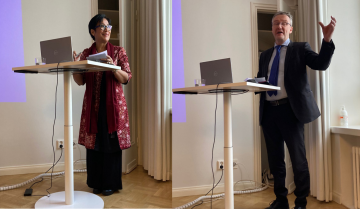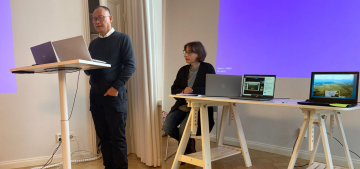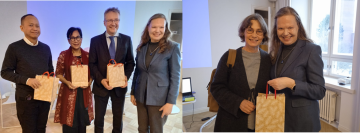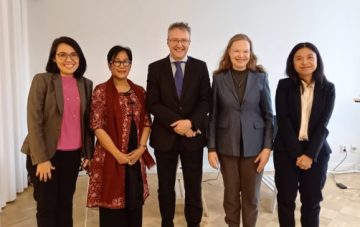Project launch event “Good and bad palm oil”: 1.12.2023
Our research project, “Good and bad palm oil. Paradigm shift and stakeholder negotiations in Indonesia and the EU”, funded by the Kone Foundation (2023-2027) officially held its launch on Friday 1st December 2023, at Kamari “The Chamber”, in Helsinki.
The team members are Erja Kettunen-Matilainen, the Principal Investigator of this project; Ayu Pratiwi, and Ratih Adiputri (starting the project in 2024). The distinguished guest speakers of the event were HE Ratu Silvy Gayatri, the Ambassador of the Embassy of the Republic of Indonesia; HE Jari Sinkari, Director General, Dept. for the Americas and Asia of the Finnish Ministry of Foreign Affairs; Dr Marcelino Pandin, a member of Indonesian Policy Analysts Association, and Dr Anu Lounela, a senior researcher from the University of Helsinki. The team members, Erja Kettunen-Matilainen and Ayu Pratiwi also delivered the overview and recent updates about the project. The event was moderated by Ratih Adiputri.

In the first session—after the introduction of the research by the PI—, the Indonesian Ambassador Mme Silvy emphasized the importance of palm oil and the corresponding investigation about the commodity that supports the economy and well-being of the people, particularly the smallholders, as well as owners of medium-sized farms. In her briefing, she emphasized the on-going EU-Indonesia partnership collaborations, also in the regional context, between the EU and ASEAN with the Joint Working Group. Indonesia’s concern about the European Deforestation Regulation (EUDR) and the importance of a bilateral relationship between Indonesia and Finland were also conveyed. The presentation was followed by the speech by the director general of Dept. America and Asia at the Finnish Ministry of Foreign Affairs, Mr Sinkari, who updated on the continuous relationship between Indonesia and Finland. The updates highlighted that, in line with EU practices, palm oil in Finland is primarily used in industrial applications rather than in household consumption. Thus, Finland (and the EU) needs to ensure that palm oil plantations are no longer linked with deforestation, despite palm oil expansion not being the only cause of deforestation in Indonesia.

After the briefings on government relations between Indonesia, Finland and the EU, the second session deepened the discussion on the topic of green financing for palm oil and its growth opportunities. Dr. Marcelino Pandin used the framework of Environment, Social, and Governance (ESG) in his presentation, and emphasised (among other factors) the importance of accurate and updated delineation between forests and plantations. Palm oil is indeed instrumental for Indonesia in economic development, renewable energy, and poverty alleviation. However, the discussion highlighted that in green financing for palm oil, there are at least three ethical frameworks to be considered: right-based (focusing on the voice of local people and their right to the ecosystem), utilitarian-based (considering cost and benefit perspectives) and justice-based (involving norms, competition, and compensation values). This topic was nicely followed up by Dr. Anu Lounela’s research on frontier-making and resource commodification in Indonesia and Southeast Asia, describing the relationship between states, people and nature. She explained how nature commodification was used widely to re-evaluate nature as a commodity for markets. In frontier-making, actors try “creating empty lands, mapping and unmapping landscapes, territorial expansion of people, plants… that are connected with resource industry”. The results then produced changes in socio-natural relations and landscapes, with qualities and forms of human and non-human connections being changed and creating vulnerabilities.

Ultimately, the main objective of our research is to bring together the views of relevant stakeholders at both the grassroots level and political decision-making and this event is the first step for us in the identification of the state-of-the-art. Erja Kettunen-Matilainen mapped the position of Indonesia as a vegetable oil exporter, discussed palm oil consumption, and shared data on land use and production by specific crops. Palm oil is found to yield higher productivity with relatively lower land use compared to other vegetable resources. Finally, Ayu Pratiwi outlined the preliminary findings of our study, using news web scraping, that English media discourse tends to dominate with more ambivalent and negative sentiments towards palm oil, while Indonesian media is more polarized, emphasizing more trade discrimination issues perceived to be committed by the Western entities.

The project launch event reassured us of the complexity of palm oil issues, involving different actors (governments, stakeholders, and smallholders), values (norms, economics, benefits) and entities (people, nature, environment). Yet, we are optimistic that our research is valuable and useful. Finally, we were grateful for the support from the Indonesian embassy, the Finnish Ministry for Foreign Affairs, and the KONE Foundation for our event, and we look forward to continuing our research next year.